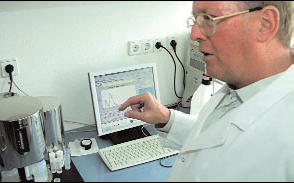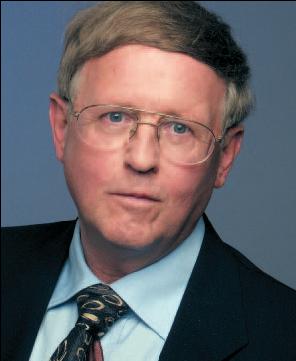|
Written by Bundesministerium für Bildung und Forschung (BMBF)
|
|
Saturday, 01 January 2005 |
Brücken bauen an der Elbe - Moderne Medizin nutzt Biotech-Know-how
Das InnoRegio-Netzwerk BioMeT Dresden bringt Forscher und Unternehmer zusammen.
 RESprotect-Gründer Prof. Rudolf RESprotect-Gründer Prof. Rudolf
Fahrig mit einem Labortest seines
Anti-Resistenz-Nukleosids.
„Eigentlich fiel mir der Absprung leicht”, sagt Rudolf Fahrig. Mit 59 Jahren allerdings ein gewagter Sprung – aus dem gesicherten Beamtendasein in die Selbstständigkeit: „Schließlich ging es um mein Lebenswerk.” Seit 1984 hat der Biologie-Professor fast zehn Jahre lang am Fraunhofer-Institut Hannover geforscht, bis er eine Substanz entwickelt hatte, die eine Resistenz von Krebszellen gegen die Chemotherapie verhindert. „Dann habe ich noch mal sechs Jahre gebraucht, bis dieses Nukleosid beim Menschen anwendbar war”, erzählt Fahrig weiter. Und nur weil die Pharmafirma, mit der er zusammenarbeitete, 1999 pleite war, sollte seine revolutionäre Entwicklung in der Schublade bleiben? „Da wollte ich es lieber selbst versuchen”, erinnert sich Fahrig, und so gründete er im Mai 2000 seine Firma „RESprotect”.
|
|
Read more...
|
|
|
Written by BioCentury
|
|
Monday, 20 December 2004 |
Clinical Status 2004

20. Dezember
2004
Australian Cancer Technology Ltd. (ASX:ACU), Perth, Australia
Bioaccelerate Inc., New York, N.Y.
RESprotect GmbH, Dresden, Germany
-
Product: RP101
-
Business: Cancer
-
Molecular target: NA
-
Description: Inhibits induced chemoresistance and enhances chemosensitivity
-
Indication: Treat metastatic pancreatic cancer
-
Endpoint: NA
-
Status: Started Phase II
-
Milestone: NA
-
The partners began an 8-month, double-blind, placebo-controlled, German Phase II trial in 22 patients with metastatic pancreatic cancer. The patients will receive RP101 tablets in combination with gemcitabine.
|
|
|
Written by Wirtschaftsförderung Sachsen GmbH
|
|
Wednesday, 01 December 2004 |
Born in Saxony! - Biotechnologie in Saxony. The future growth here Core Biotech Companies Core Biotech Companies
Saxony’s core biotechnology economy (as defined by Ernst and Young) has particular strengths in genomics, proteomics, tissue engineering, diagnostics, drug discovery, environmental biotechnology and clinical biotechnology. Stem cells are the specialty of VITA 34 AG in Leipzig. The company Gene Bridges GmbH in Dresden is specializing in advanced DNA engineering, while Cenix BioScience GmbH Dresden develops the cutting edge technology RNAi for functional genomics, including target validation and RNAi therapeutics.
Nimbus Biotechnologie GmbH in Leipzig develops bead-based assays for biotechnology and medical applications, as well as technology and service for high throughput screening of membrane proteins.
The Dresden based company RESprotect GmbH develops recombination based protocols and therapeutics for cancer and infectious diseases specializing in reversing or suppressing resistance to chemotherapeutic agents.  Prof. Dr. Rudolf Fahrig »Saxony, as a location of industry and commerce, offers two major advantages for establishing biotech companies there: a vivid scientific background and the support by the Dresden local government and by the State of Saxony. Another decisive advantage of Saxony and, in particular, Dresden is the professional training of future founders of biotech companies in the recently established competence centers in the universities as well as in the Max-Planck-Institute of Molecular Cell Biology and Genetics.« Prof. Dr. Rudolf Fahrig »Saxony, as a location of industry and commerce, offers two major advantages for establishing biotech companies there: a vivid scientific background and the support by the Dresden local government and by the State of Saxony. Another decisive advantage of Saxony and, in particular, Dresden is the professional training of future founders of biotech companies in the recently established competence centers in the universities as well as in the Max-Planck-Institute of Molecular Cell Biology and Genetics.«
(Managing Director RESprotect GmbH, Dresden)
|
|
|
Written by Administrator
|
|
Monday, 04 October 2004 |
Deals: ACT - RESprotect

04. Oktober 2004
Australian Cancer Technology Ltd. (ASX:ACU), Perth, Australia
RESprotect GmbH, Dresden, Germany
-
RESprotect granted ACU a North American license to RP101, a chemopotentiator that has completed a Phase I/II trial in metastatic breast, ovarian and pancreatic cancers, as well as small cell and non-small cell lung cancers. An expansion of that trial is ongoing in metastatic pancreatic cancer. RESprotect said RP101 down-regulates the oncogene STAT3 and APEX, a DNA repair gene, which are overexpressed in pancreatic cancer. ACU plans to submit an IND in 2005 and will seek Orphan Drug designation for pancreatic cancer.
|
|
|
Written by Australian Cancer Technology Ltd.
|
|
Monday, 20 September 2004 |
AustCancer Targeting European Investors through Frankfurt Exchange Xetra Listing

ASX/MEDIA RELEASE
Monday 20 September 2004
Sydney, Australia. The Board of the rapidly growing international biotechnology company, Australian Cancer Technology (“AustCancer” ASX:ACU) today announced that it has undertaken a secondary listing on the Xetra exchange, the electronic trading system of the Frankfurt Stock Exchange.
AustCancer has contracted the Frankfurt based securities broker dealer firm, Seydler AG Securities and Financial Services, to act as Market Maker and Designated Sponsor for the company’s shares on Xetra.
The Xetra listing is part of AustCancer’s strategy to broaden its international shareholder base. The company already has a Level 1 ADR program on NASDAQ (Code AUCJY) and plans to complete a small cap NASDAQ listing by the third quarter of the current financial year. The German listing is particularly significant, given AustCancer’s recently announced agreement with the German company RESprotect GmbH to acquire the North American licence to the highly promising developmental pancreatic cancer drug RP101.
The code for AustCancer shares on Xetra is CBS and the German securities code (ISIN) is AU000000ACU7.
Dr Roger Aston, AustCancer Chairman said, “AustCancer is now very much an international biotechnology company with business activities in the United States, Europe, Asia and Australia and we are keen to also grow our international shareholder base. The Xetra listing gives European investors, particularly those familiar with the German pancreatic drug technology we have recently acquired, the opportunity to participate in the growth opportunities we have available to us.”
ENDS-
PLEASE DIRECT ENQUIRIES TO:
Paul Hopper
Managing Director
Australian Cancer Technology
Phone: +61 2 9252 6899
Cell: +61 407 118 366
This e-mail address is being protected from spam bots, you need JavaScript enabled to view it
Rene Parmantier
Seydler AG Securities and Financial Services
Phone: +49 (0) 69 92054 130
Email:
This e-mail address is being protected from spam bots, you need JavaScript enabled to view it
|
|
Read more...
|
|
|
Written by RESprotect GmbH
|
|
Monday, 20 September 2004 |
RESprotect grants North America-License for anti-cancer drug to AustCancer20th September 2004 - RESprotect GmbH from Dresden signed an license agreement with Australian Cancer Technology ("AustCancer") (ASX:ACU). The Australian Biotech company specialized to oncology, acquires the license for the use of the anti-cancer drug RP101 in North America. The drug is the first commercial breakthrough of the company. Anti-cancer drugs that are developed. RESprotect develops at present four additional anti-cancer drugs. RP101 is targeted at preventing cells from developing a resistance to chemotherapy. In most cases, long term treatment with chemotherapy leads to resistance against this treatment. This is one of the most challenging areas facing oncologists. RP101 would used as a co-treatment with cytostatic drugs to give a broader range of chemotherapy treatment options, thereby extending survival periods and improving quality of life for the cancer patients. RP101 has demonstrated promising results in a clinical Phase I/II pilot study. AustCancer has developed an accelerated clinical trial program for RP101 which would include application to the US FDA for Orphan Drug status. A Phase I/II pilot clinical study with 30 patients in Saxonian clinics over 5 tumor types (metastasized breast, metastasized ovarian, non small cell lung cancer, small cell lung cancer and metastasized pancreatic cancer) was completed in 2003 with different chemotherapy agents. Unexpected results led to an enlargement of the pilot trial in respect to metastasized pancreatic cancer patients. An interim analysis, it seems likely that RP101 co-treatment significantly enhances survival time, remissions, time to progression and response to chemotherapy. RESprotect's founder and major sharehoulder, geneticist Professor Dr. Rudolf Fahrig commented that "results from the Phase I/II pilot trial are very promising and show particular efficasy in pancreatic cancer patients. This is probably due to the fact that when tested in vitro with tumor cells, RP101 has a major effect in down-regulating the oncogene STAT3, and the DNA-repair gene APEX, which are over-expressed in pancreatic carcinoma" AustCancer's Chairman, Dr. Roger Aston said, "While the patient numbers in the previous pancreatic trials were small, the results appear significant. We believe that the drug may offer new or significant improvements for pancreatic cancer by satisfying unmet medical needs, and therefore might qualify for Orphan Drug status when lodge the IND (Investigative New Drug application) in the US next year". Cancer of the pancreas is the fifth leading cause of cancer deaths with mean survival time for locally metastasized pancreatic cancer of 4-6 months with a 2-year survival rate of 10%. There are approximately 20,000 new pancreatic cancer patients in the US or Europe each year. RESprotect is closely associated with the Universities of Leipzig, Munich, Vienna and The Technical University of Dresden. The intellectual property for this development came from the Fraunhofer Society of Munich, a leader in applied research in Europe, where Prof. Fahrig worked unil the year 2000. Professor Fahrig has agreed to join the AustCancer Scientific Advisory Board. |
|
Read more...
|
|
|